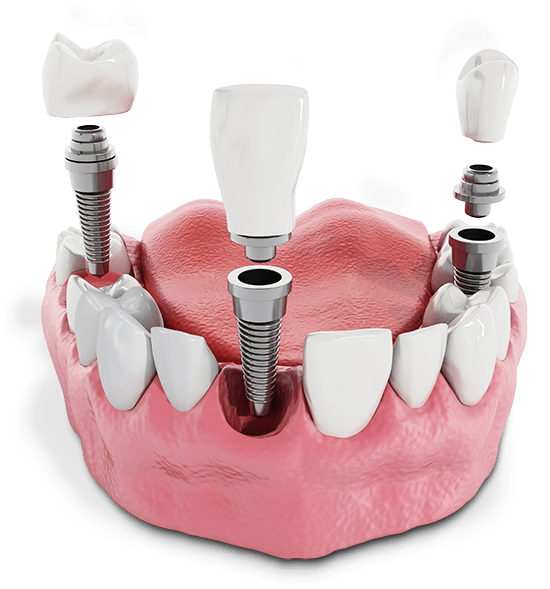Forget allergies to titanium alloys, corrosion, and the risk of rejection. We use innovative, metal-free CeraRoot implants that simply don't have these drawbacks.
10 Reasons To Use Metal-Free Zirconia Dental Implants

1.- Biocompatibility & Optimal Osseointegration:
CeraRoot implants are made from zirconia—a biocompatible, ceramic material that fosters complete assimilation into jaw bone. A recent microscopic study performed at the University of Minnesota confirmed optimal osseointegration of CeraRoot implants without any signs of inflammation or foreign body rejection. Other scientists have also reported that zirconia is an ideal material for dental implants.
2.- Allergies & Sensitivities:
CeraRoot zirconia implants are hypoallergenic, which is not the case with metal implants. Surprisingly, many cases of titanium implant sensitivity show up years after surgery when itchiness and inflammation develop around implant sites. It’s a perfect setup for bone loss and the potential failure of an implant.
Today, there’s a growing number of people who have allergies, skin sensitivities and compromised immune systems; therefore implantation of metal devices should be seriously scrutinized beforehand, especially since the removal of a titanium implant from jaw bone is not a simple procedure.
3.- Esthetics:
The inherent problem that frequently arises with titanium implants is an aesthetic one. Patients with thin, translucent gums or those who are prone to gum recession (as are many aging people) may end up with the gray gums or titanium showing around the margin of the crown. Since zirconia is non-metallic and white, it is much more natural looking than titanium. It’s a perfect base color that closely mimics what nature created in the first place.
A metal aura is visible around the gum line of the two upper front teeth with metal/ceramic crowns. In addition to aesthetic issues, the teeth were deemed endodontic failures. The surgical treatment plan included two tooth extractions and the immediate placement of CeraRoot implants. After healing, all-ceramic crowns were cemented onto the implants, and the final result is a beautiful, natural smile.
4.- Corrosion resistant:
Zirconia is biocompatible material that is resistant to chemical corrosion, nor will it conduct electricity or heat. As a bioinert material, it will never trigger chemical reactions, migrate to other sites in the body or interfere with the maintenance of optimal oral health.
Titanium is another story. It’s been scientifically proven that a titanium implant will corrode in the wet environment of a mouth, especially if there is more than one metal in the vicinity (such as amalgam fillings, alloy metal crowns, bridges or gold onlays / inlays) to trigger reactions. Metal corrosion is even more active in the presence of fluoride that is free flowing in some water supplies, toothpastes and mouthwashes. It literally attacks the surface of the titanium implants. Many scientific articles have cited that titanium will not only migrate from the implant site into surrounding tissues but even into nearby lymph nodes.
5.- Non-conductivity of zirconia:
The fact that zirconia does not conduct an electrical charge is a big benefit. Bacterial growth on the surface of a zirconia implant is far less likely to adhere due to its non-conductivity, thus creating an oral environment that promotes much healthier gums.
6.- Holistic-friendly:
CeraRoot implants do not interfere with the movement of energy though the body’s meridians. And since zirconia implants are bioinert, they’re a perfect tooth replacement solution for patients who adhere to holistic health principles.
7.- Strength:
The long-term success of CeraRoot implants is one of the most important features of this innovative system. Designed to withstand tremendous masticatory forces, CeraRoot zirconia implants mimic the best of nature with a variety of tooth-like contours and bioinert composition. Zirconia is well known for its durability and inflexibility under pressure…an excellent combination of traits for dental devices.
8.- One-piece design:
Traditional titanium implant systems consist of two metal components (the implant that’s lodged into the jaw and the abutment that sits above the gumline) joined together with a fixation screw. Micro-movement can occur where these pieces meet when under the extreme pressure of chewing, thus creating warm, moist places where anaerobic bacteria have an opportunity to colonize. It’s a perfect setup for an unfortunate cascade of events to follow: the bacteria release toxins, inducing inflammation around the implant, which can eventually lead to bone loss and the possibility of implant failure.
Over the past decades, more ceramic components have been incorporated into dentistry due to their clinically proven strength and aesthetic benefits. Not only is there a trend to include all-ceramic crowns and implant abutments in treatment plans, but the implant itself is now available in a one-piece design made from biocompatible zirconia. CeraRoot implants set the stage for the ultimate in optimal function, superior health and natural beauty.
9.- One-stage surgery:
CeraRoot implants are designed for the immediate placement after tooth extractions. This one-stage surgical approach minimizes implantation time and maximizes comfort. Moreover, a less invasive surgery (one without incisions or suturing) may be possible when there’s no infection and sufficient bone is present at the implant site.
10.- Comfort:
Overall, CeraRoot implant patients experience a shorter implant process, along with the potential for a significant increase in comfort and function afterward due to biocompatibility and the strength of zirconia. With CeraRoot, the odds are in favor of long-term success.
For more information, please contact today for an appointment at our office.
Find Out If You're A
Candidate For Dental Implants!


